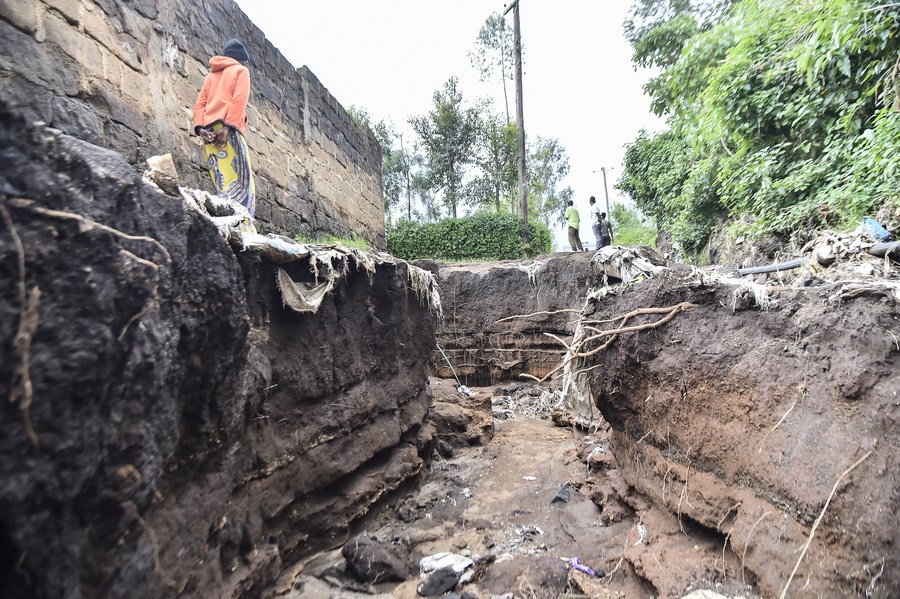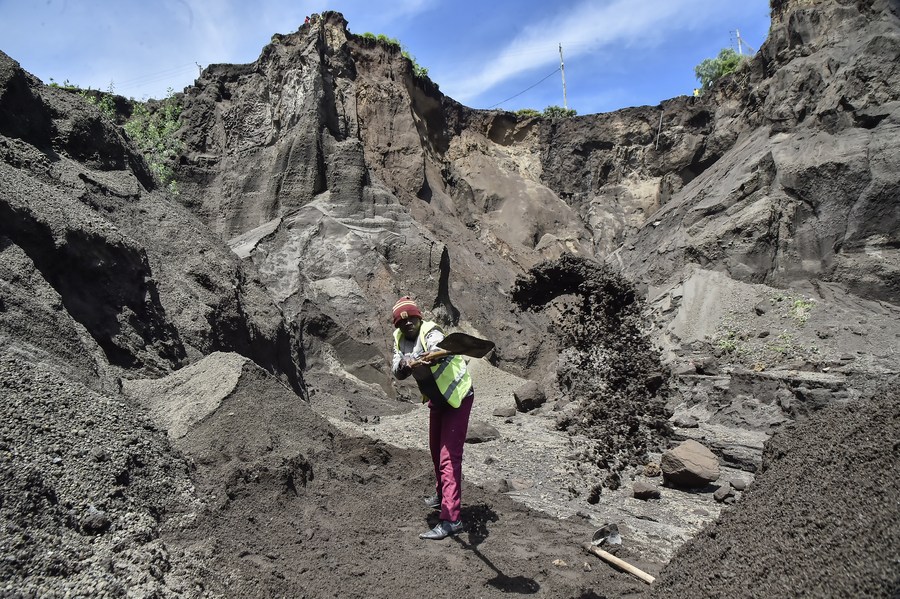
A woman walks beside a deep gully near a residential building in Rongai, Nakuru County, Kenya, May 7, 2024. (Photo by Sheikh Maina/Xinhua)
Rains have long been a blessing to Kenyan farmers, the vast majority of whom rely on them to grow crops. However, as the country continues to experience heavier rains season after season, flooding has become farmers' worst nightmare.
NAIROBI, May 8 (Xinhua) -- Rains have long been a blessing to Kenyan farmers, the vast majority of whom rely on them to grow crops. However, as the country continues to experience heavier rains season after season, flooding has become farmers' worst nightmare.
Many now wish that the ongoing heavy rains pounding the east African nation would stop, even only for a week, to give their crops time to grow.
For the past one month, most areas in Kenya have been receiving up to 200 mm of rain, resulting in heavy flooding and the death of over 230 people, authorities said.
The latest onslaught of heavy rains came after Kenya experienced prolonged drought and rains last year, effects of climate change ravaging the country in quick succession.
Most farms are now flooded, and some farmers have lost their entire crop due to surface runoff, while others are experiencing stunted or yellowing crops as rains wash away nutrients.
"I have lost all my potato crop on two acres due to the heavy rains," Arnold Maina, a banker in Kenya's capital Nairobi, told Xinhua.
"I have the crop planted in Nyandarua, just before the onset of the rainy season, hoping that all would be well," he said of his farm some 250 km from Nairobi. "But it's gone with floods."

A man harvests sand inside a depression formed by a landslide near Lake Nakuru National Park in Nakuru County, Kenya, May 6, 2024. (Photo by Sheikh Maina/Xinhua)
The crop sprouted well but then the worst happened -- the intensity of the rains increased, Maina said.
His investment of 250,000 shillings (about 1,865 U.S. dollars) are now gone with the floods.
Common food crops cultivated by farmers in East Africa include potatoes, onions, tomatoes, capsicum, cucumbers, maize, beans, and various other vegetables.
For export, they grow French beans, sugar snaps, avocados, herbs, and garden peas, among other crops.
These essential crops are now facing severe threats due to widespread flooding.
"I don't know which crop can withstand the current heavy rains that are going to last until the end of May, when they are expected to reduce in intensity. I planted French beans for export, and they are not doing well due to leaching," Violet Wanjiku, a farmer from Nakuru, said in a telephone interview.

People walk past destroyed electric cables following heavy rains in Rongai, Nakuru County, Kenya, May 7, 2024. (Photo by Sheikh Maina/Xinhua)
While remaining optimistic, Wanjiku, who sells the produce through an exporter, noted that the heavy rains that are predicted to last until July and the expected cold season that usually starts in June do not portend good times for farmers.
"The cold weather normally starts in June and lasts until August. During this period, frost affects many horticultural crops. Very few survive to end up at the market," she said.
Wanjiku, who has a Bachelor of Commerce degree and conducts farming as a business, said farmers would rather deal with drought than excessive rains.
"With drought, you can irrigate your crops and effectively battle pests," she said. "But with heavy rains, a farmer has little control over the flooding."
"You cannot even spray the crops because the chemical is washed off. Further, sometimes you cannot even access your farm," Wanjiku said.
The erratic weather that many farmers did not plan for has also not spared livestock farmers, with the ongoing rains increasing cases of diseases like foot rot and pneumonia among goats, sheep and cattle.
According to the Kenya Red Cross, about 10,000 animals, including sheep, cattle, goats and camels, have been swept away by floods while 36,344 acres of croplands have been damaged across Kenya.
Caroline Musyoka, an agronomist, said that with heavy rains, very few crops can do well, because of the flooding.
"Due to flooding, oxygen gets depleted in the soil, affecting the plants' ability to make their own feed. Some plants die; others remain stunted," she said.
Another common problem farmers are grappling with, she said, is leaching, where the rainwater carries nutrients like nitrogen and phosphorus deeper into the soil, making them unavailable for plants.
The ongoing heavy rains in Kenya pose a significant threat to the country's food security, Musyoka said.
"Most crops certainly won't do well due to the extended rain period. Therefore, a few months down the lane, Kenya would start to experience food shortages due to poor harvest," she said. ■












